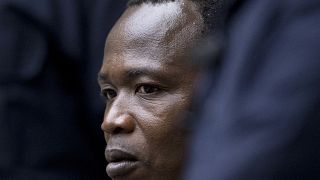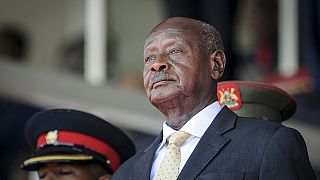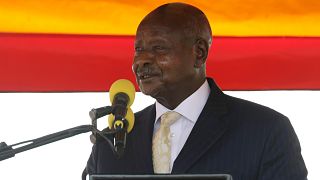Uganda
Residents of Gulu, a city in northern Uganda and home town of Dominic Ongwen, have greeted the news of the former child soldier's sentencing by the International Criminal Court ICC with mixed reactions.
Dominic Ongwen, a Ugandan child soldier who became a commander of the notorious Lord's Resistance Army (LRA), was on Thursday sentenced to 25 years in jail for war crimes and crimes against humanity by the ICC.
"The years that they have given him is too much. If you were to compare from the time they (LRA) caught him and taken by Joseph Kony he was still young. And all that he was doing it was not his need. He has been forced to do all the crime that he has been doing." says Jonathan Bagonza, a businessman in Kampala.
For Flavia Lakot, a Ugandan who works with child protection, Ongwen should be brought back home."So, the judgement has happened. Well, we forgive him, but to my own opinion I would say they bring him back home. And then he serves his sentence from back in Uganda and in Northern Uganda. Not just leaving him there. Because we really want to see what’s happening in the jail." Lakot said.
The LRA was founded three decades ago by former Catholic altar boy and self-styled prophet Kony, who launched a bloody rebellion in northern Uganda against President Yoweri Museveni.
Its brutal campaign to set up a state based on the Bible's Ten Commandments left more than 100,000 people dead and 60,000 children abducted, eventually spreading to Sudan, the Democratic Republic of Congo, and the Central African Republic.
Ogwen's brother, David Johnson Onelalit, says he is shocked by the duration of the sentencing.
"With all things, I thought that it was going to be nine years, but I was shocked when I heard 25 years. I feel very, very painful."
Ongwen, 45 -- whose nom de guerre was "White Ant" -- was found guilty in February of 61 charges, including murders, rapes and sexual enslavement during a reign of terror in the early 2000s by the LRA, led by the fugitive Joseph Kony.
"In light of the gravity of the crimes that you committed... the Chamber sentences you to a total period of imprisonment of 25 years," presiding judge Bertram Schmitt said Thursday.
Prosecutors had asked for a 20-year prison term, saying Ongwen's own history as a schoolboy abducted by the LRA justified a lower sentence than the maximum 30 years to life allowed by the ICC.
The defence had sought a 10-year prison term for Ongwen for attacks by his soldiers on refugee camps in northern Uganda.
Victims of his crimes had asked the court to impose the full life sentence.
Schmitt said the court was faced with a "unique situation" with the case, saying Ongwen was both a criminal and a victim.
"The Chamber... is confronted with a perpetrator who wilfully brought tremendous suffering upon his victims," he said.
"However, it is also confronted with a perpetrator who himself had previously endured extreme suffering himself at the hands of the group of which he later became a prominent leader."
During the trial, Ongwen told the court that the LRA forced him to eat beans soaked with the blood of the first people he was made to kill as part of a brutal initiation following his own abduction aged nine.
"I am before this international court with so many charges, and yet I am the first victim of child abduction. What happened to me, I do not even believe happened to Jesus Christ," Ongwen said.
**- The Verdict- **
Judges said in their verdict in February that Ongwen personally ordered his soldiers to carry out massacres of more than 130 civilians at the Lukodi, Pajule, Odek, and Abok refugee camps between 2002 and 2005.
Civilians were locked in their homes and burned to death or beaten during the massacres, while mothers were made to transport the LRA's loot, forcing them to abandon their infant children by the roadside.
Ongwen was also the first person convicted by the ICC of the crime of forced pregnancy, for abducting and raping so-called "wives", some of whom were underage.
Prosecution lawyer Colin Black said that Ongwen's own history as a child soldier "does not in any way diminish the gravity of the crimes, nor does it diminish his criminal culpability."
"Nevertheless we consider them to be exceptional individual circumstances of a kind that warrant a significant reduction in sentence," he argued.
Ongwen surrendered to US special forces who were hunting Kony in the Central African Republic in early 2015 and he was transferred to the ICC to face trial.










01:13
Uganda reopens border with M23-held eastern DRC
Go to video
Tunisia sentences prominent opposition leader to 14 years in prison
01:09
Liberian president issues official apology to civil war victims
Go to video
US deports eight men to South Sudan after legal battle
01:00
Pix of the Day: July 3, 2025
01:45
From Uganda to NYC: Zohran Mamdani's rise in American politics